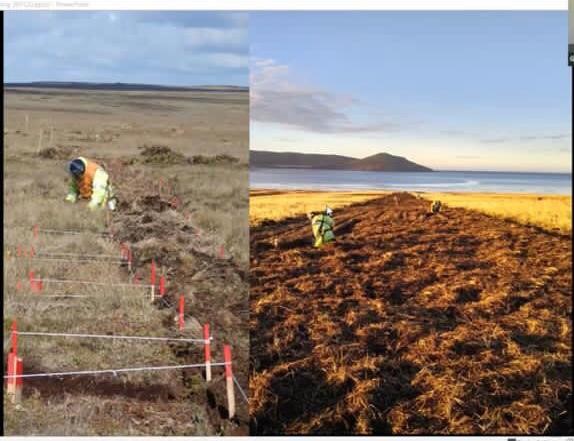I’ve spent much of the last two weeks in virtual meetings of the Anti-Personnel Mine Ban Convention (APMBC) and the Convention on Cluster Munitions (CCM).
Land mines and cluster munitions are especially pernicious weapons. They claim lives and limbs, and prevent civilians from returning to their land, for sometimes decades after conflict is over. One of the central provisions of both conventions, therefore, is that states must clear their territory of any land mine or cluster munition contamination; another is that other states in a position to do so should assist them.
Last week, at the 18th meeting of States Parties to the APMBC, I announced that the UK had just completed the protracted process of clearing the Falkland Islands of the mines laid during the 1982 conflict. That involved enormous technical and logistical challenges: the Islands are very remote, the weather conditions can be extreme, and many of the mines were buried under 10-metre high sand dunes or in swampy peat. Following an initial six-year feasibility study, it took 11 years for our courageous and highly skilled clearance team to clear 122 minefields covering over 23 km2 of land. Some of those involved in that effort talked of the experience at a side event on the last day of the meeting, and a member of the Islands’ Legislative Assembly spoke very movingly about the impact on the community. For them, almost 40 years on, the conflict really is now over.
The UK has also long been at the forefront of assisting other states with their own clearance obligations. British organisations, charitable and commercial, have led the way, including two of the best-known humanitarian deminers, the Mines Advisory Group (MAG) and the HALO Trust. The UK Government has invested significantly in this effort over several decades, and this month we announced an extra £36 million for our Global Mine Action Programme to March 2021, allowing our partners to continue their work in 14 of the most heavily mined countries in the world.
Our impact hasn’t just been financial. The lessons learned from demining the Falklands have already informed the International Mine Action Standards. A project to standardise metrics for mine action operators that arose from the UK’s first Global Mine Action Programme is on course to do the same. Our Deputy Permanent Representative, Simon Cleobury, chaired the APMBC’s Committee on Enhanced Cooperation and Assistance this year, organising donor meetings (known as the Individualised Approach) for Bosnia and Herzegovina, the DRC and Niger, and advocating for research into innovative forms of financing to make up the projected $1 billion shortfall in funding for mine action from traditional donors. (We’ll be funding some of that research ourselves, too.) And we’ll be taking on the Presidency of the CCM from Switzerland in February, once the Review Conference concludes its work.
One remarkable feature of this area of disarmament diplomacy is its sense of collective endeavour, focused on the ambitious goal of a mine free world by 2025. That’s perhaps why only these two conventions have been able to agree to hold our meetings in virtual format, given the prevailing COVID-19 restrictions. Mine operators and affected communities have had to adapt to the difficult circumstances, and so should we.

